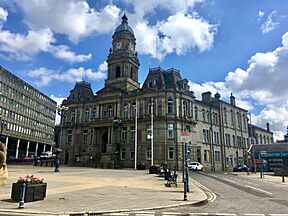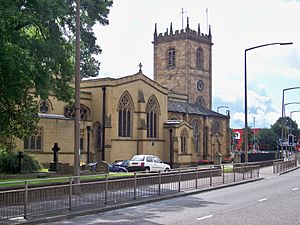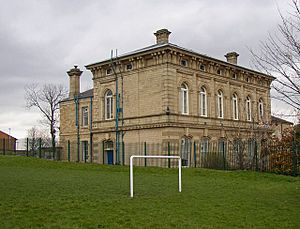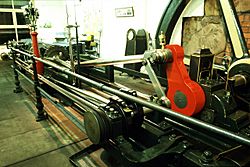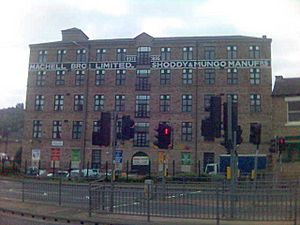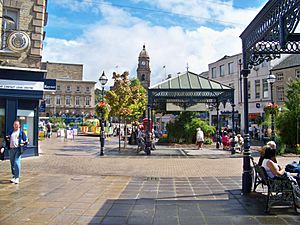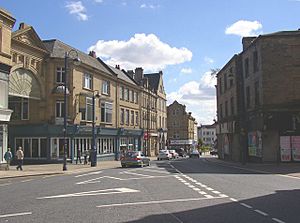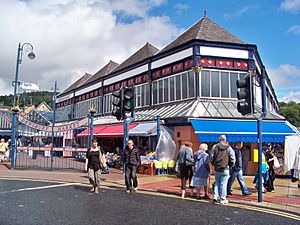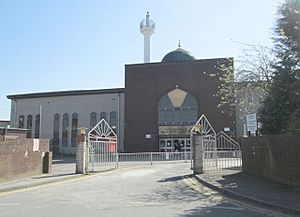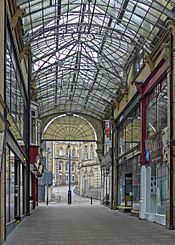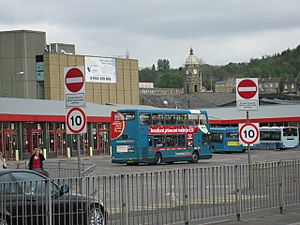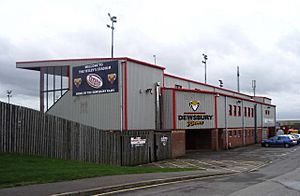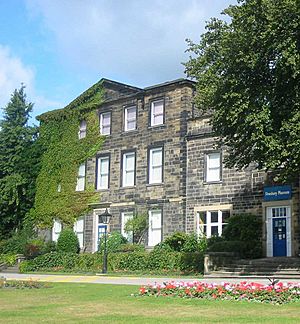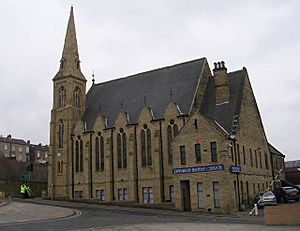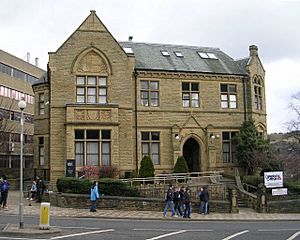Dewsbury facts for kids
Quick facts for kids Dewsbury |
|
|---|---|
|
Clockwise from top: Dewsbury Town Hall, Minster Church, Townscape, Markazi Masjid in Savile Town and Market Place |
|
| Population | 61,035 (Wards, 2021 Census) |
| OS grid reference | SE245225 |
| • London | 188 mi (SE) |
| Metropolitan borough | |
| Metropolitan county | |
| Region | |
| Country | England |
| Sovereign state | United Kingdom |
| Post town | DEWSBURY |
| Postcode district | WF12-13 |
| Dialling code | 01924 |
| Police | West Yorkshire |
| Fire | West Yorkshire |
| Ambulance | Yorkshire |
| EU Parliament | Yorkshire and the Humber |
| UK Parliament |
|
Dewsbury is a busy market town in West Yorkshire, England. It sits by the River Calder and a part of the Calder and Hebble Navigation waterway. It's located west of Wakefield, east of Huddersfield, and south of Leeds. Dewsbury grew a lot in the 1800s as a mill town, known for making wool products. Today, it's the biggest town in the Heavy Woollen District. In 2021, about 63,722 people lived in the built-up area.
Contents
History of Dewsbury
What's in a Name?
The name Dewsbury comes from old records like the Domesday Book of 1086. It was written as Deusberie or Deusberia. This probably means "Dewi's fort," where Dewi is an old Welsh name like David, and "bury" means a fort or town.
Another idea is that it means "dew hill," because Dewsbury is built on a hill and is close to the River Calder.
Early Times
In Anglo-Saxon times, Dewsbury was a very important place. It was a religious center for a large area, including Huddersfield and Bradford. Legend says that in 627, Paulinus, a bishop from York, preached by the River Calder here. Old graves from the Anglian period have been found in Dewsbury.
Dewsbury Minster is a church near the River Calder. It's believed to be where Paulinus preached. Some parts of the church are very old, from Saxon times and the 1200s. The church tower has a bell called "Black Tom." Every Christmas Eve, it rings once for each year since Christ's birth. This tradition, called the "Devil's Knell," started in the 1400s.
In 1086, Dewsbury was a small village with only nine families. Over time, it grew. A market was set up in the 1300s for local cloth makers. It closed for a while due to the plague but reopened in 1741.
The Industrial Revolution
In 1770, a canal branch was built, connecting Dewsbury to other towns and cities like Manchester and Hull. This helped the town grow. Dewsbury became a center for making "shoddy" and "mungo." This was a way of recycling old wool clothes and rags by mixing them with new wool to make things like blankets and uniforms.
The town's location, the canal, and nearby coal mines helped its economy. Railways arrived in 1848, making it even easier to transport goods. Dewsbury's population grew a lot during the 1800s, from about 4,500 people in 1801 to 30,000 by 1890.
This fast growth also brought challenges. In the early 1800s, some workers called Luddites protested against new machines that they feared would take their jobs. Later, in the 1830s, Dewsbury was a center for Chartists, who wanted more rights for working people. Troops were even sent to keep order.
The "Ten o'Clock" gun was fired from a mill starting in 1815 to let people know everything was okay. This tradition continued until 1983 when the mill closed. After the 1970s, the textile industry in Dewsbury declined, but some businesses, like bed manufacturing, still employ many people.
Recent Times
After the 1960s, many people from other countries moved to Dewsbury, especially from India and Pakistan. This has made the town a very diverse place.
In 2010, the Dewsbury Revival Centre opened in a renovated church. This church was once attended by Wallace Hartley, the bandmaster of the Titanic.
How Dewsbury is Governed
Dewsbury became a municipal borough in 1862, which means it had its own local government. Its first mayor was Dr. George Fearnley. The Victorian town hall, built between 1886 and 1889, is a famous building in the town.
In 1974, Dewsbury became part of Kirklees Metropolitan Council, which is based in Huddersfield. The number of people living in Dewsbury has stayed about the same for the last 100 years.
The current MP for Dewsbury and Batley is Iqbal Mohamed. He was elected in 2024.
Where is Dewsbury?
Dewsbury is located about 8 miles (13 km) from Leeds and Bradford to the north, and a similar distance from Huddersfield to the south west. Wakefield is about 6 miles (10 km) to the east. Being close to these major cities and the M1 and M62 motorways helps Dewsbury grow.
Dewsbury is part of the larger West Yorkshire Urban Area. Its built-up areas connect with nearby towns like Batley and Heckmondwike. The town is built on hills, like Earlsheaton and Dewsbury Moor. The town center is about 130 to 180 feet (40 to 55 meters) above sea level, rising to 755 feet (230 meters) at Grange Moor.
Areas of Dewsbury
Dewsbury has several different areas, each with its own character. Some of these include Chickenley, Crackenedge, Dewsbury Moor, Earlsheaton, Eastborough, and Savile Town. Some areas like Batley Carr and Hanging Heaton are partly in Dewsbury and partly in neighboring Batley.
 |
Heckmondwike | Batley |  |
|
| Ossett | ||||
| Mirfield | Flockton |
People and Economy
The Westtown area is home to the large Our Lady and St. Paulinus Roman Catholic Church and its school. The Irish National Club is also here, home to the Dewsbury Celtic amateur rugby league club.
Dewsbury has a large Muslim community, especially in areas like Savile Town and Ravensthorpe, with many people of Indian and Pakistani heritage. There are also smaller communities of Iraqi Kurds and Hungarians. Some parts of Dewsbury are considered among the most in need in the UK, while the east side of town is generally more well-off. Most houses in Dewsbury are in the lowest council tax band, meaning house prices are among the lowest in the country.
Dewsbury's market used to have 400 stalls and was one of the busiest in Yorkshire, attracting many visitors. Market days are Wednesdays and Saturdays, with a popular flea market on Fridays. Many of the old mill buildings have been reused, and Carlton Cards, a large employer, is located in this area.
Who Lives in Dewsbury?
According to the 2011 census, about 30% of Dewsbury's population was White British. The British Asian population was 64%, mostly of Pakistani origin. Other groups made up 6% of the population.
Religions in Dewsbury
In 2021, Dewsbury's population was 46.4% Muslim, 28.9% Christian, and 23.7% had No Religion. There are also small Hindu and Sikh communities.
Getting Around Dewsbury
Dewsbury has a bus station managed by West Yorkshire Metro. It was rebuilt in 1994 and has 19 bus stands. The town is also served by Dewsbury railway station, with train services run by Northern Trains and TransPennine Express.
Sports in Dewsbury
The local rugby league team is Dewsbury Rams, who play at Crown Flatt. Another amateur rugby league club is Shaw Cross Sharks, which has produced several professional players. Dewsbury Celtic is another rugby league club, based at the Dewsbury Irish National Club. Dewsbury is also home to Dewsbury Rangers Football Club, one of the largest football clubs in the area with over 300 members.
Culture and Fun
Dewsbury Museum used to be in the mansion house in Crow Nest Park, but it closed in 2016. Nearby, you can visit the National Coal Mining Museum for England.
Dewsbury Town Hall has a concert hall that seats 700 people. It hosts concerts, exhibitions, live music, and other events. The town also has an annual winter event called Spirit, which is a street theatre show in the town center.
The 2018 comedy film Destination: Dewsbury was filmed and partly set in the town.
Local News and Media
Local news and TV shows for Dewsbury are provided by BBC Yorkshire and ITV Yorkshire.
Dewsbury has several local radio stations, including BBC Radio Leeds (92.4 FM), Heart Yorkshire (106.2 FM), and Capital Yorkshire (105.6 FM). There's also Branch Radio (101.8 FM), a community radio station based in the town. The local weekly newspaper is the Dewsbury Reporter.
Education in Dewsbury
Dewsbury used to have two grammar schools, Wheelwright Grammar School for Boys and Wheelwright Grammar School for Girls. In the 1970s, these became high schools. Dewsbury College later merged with Huddersfield Technical College to become part of Kirklees College in 2008.
Batley College of Art and Design, which is also part of Kirklees College, is well-known for its art programs. St John Fisher Catholic Voluntary Academy is a specialist Sports College and has a Sixth Form.
Famous People from Dewsbury
Many notable people were born or lived in Dewsbury. Here are a few:
- Sir Thomas Clifford Allbutt (1836–1925), a doctor who invented the medical thermometer.
- Betty Boothroyd, Baroness Boothroyd (1929–2023), the first female Speaker of the House of Commons.
- Bob Hardy (born 1980), bassist for the band Franz Ferdinand.
- Tom Kilburn (1921–2001), a computer engineer who helped invent the first stored-program computer.
- Andrew Morton (born 1953), a writer and journalist known for biographies of royalty.
- Sir Owen Willans Richardson (1879–1959), a physicist who won the Nobel Prize in Physics.
- Sayeeda Warsi, Baroness Warsi of Dewsbury (born 1971), a Conservative politician.
Sports Stars
- Alistair Brownlee (born 1988), a triathlete who won gold medals at the 2012 and 2016 Olympics.
- George Burgess (born 1992), Luke Burgess (born 1987), Sam Burgess (born 1988), and Tom Burgess (born 1992) are all professional rugby league players.
- Mike "Stevo" Stephenson (born 1947), a Sky Sports commentator and former rugby league player.
- Eddie Waring (1910–1986), a famous rugby league coach, commentator, and TV presenter.
|
See also
 In Spanish: Dewsbury para niños
In Spanish: Dewsbury para niños
 | DeHart Hubbard |
 | Wilma Rudolph |
 | Jesse Owens |
 | Jackie Joyner-Kersee |
 | Major Taylor |


